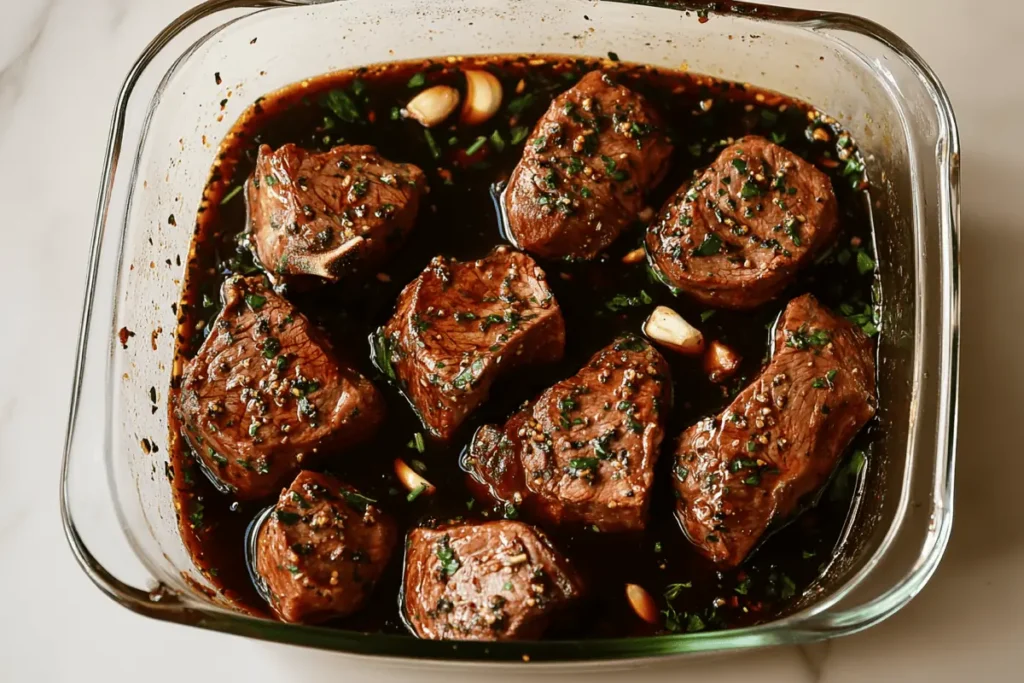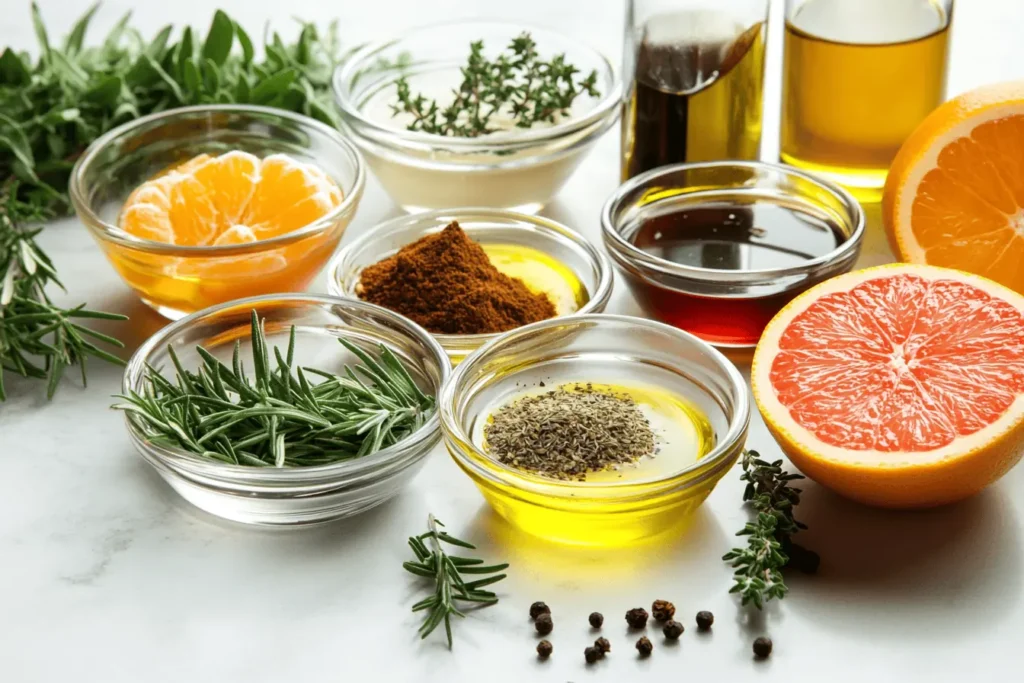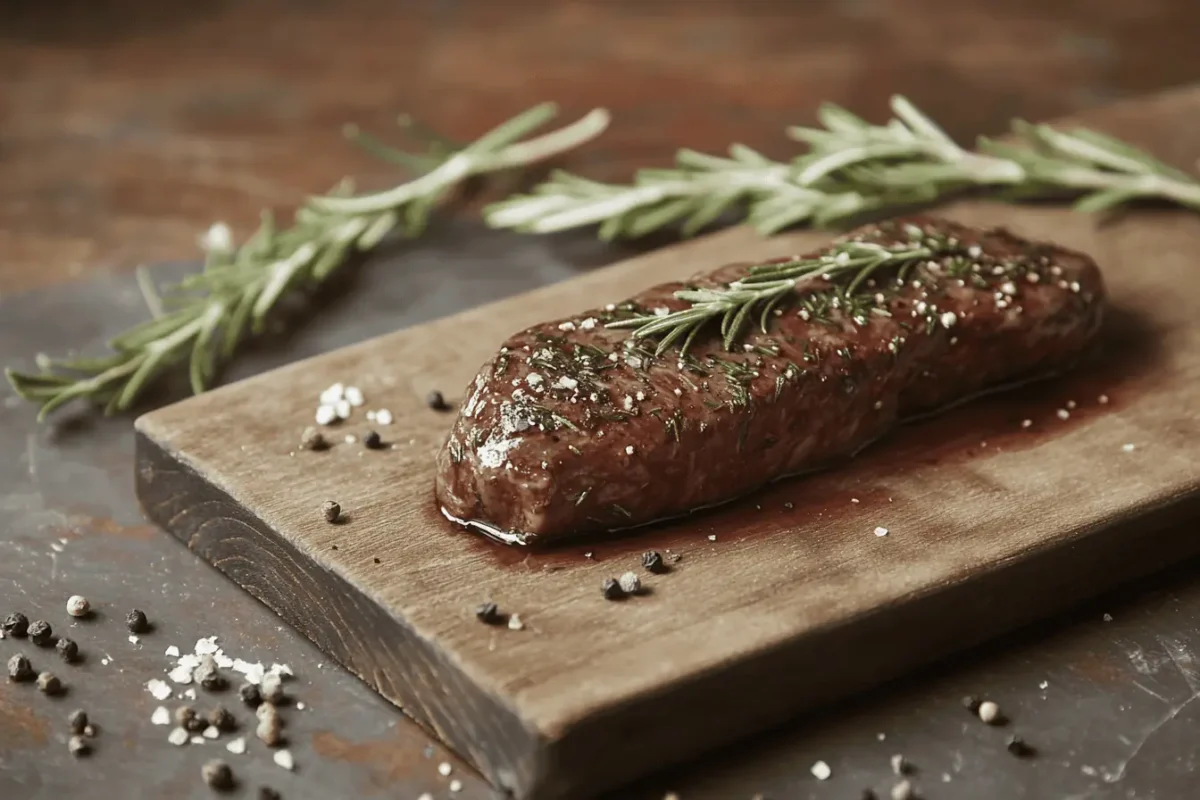How long can you marinate venison? This question often arises among home cooks eager to enhance the flavor and tenderness of their game meat. Venison, known for its rich taste and lean texture, can transform into a delicate, melt-in-your-mouth centerpiece with the right marinade and timing. However, many home cooks feel uncertain about how long to leave their venison soaking in a flavorful blend. By understanding the best practices, recommended durations, and critical safety considerations, you can ensure each bite is tender and delicious.
This comprehensive guide not only answers the question of how long you can marinate venison but also explores the key factors that influence marinating time. Additionally, it provides helpful tips on selecting the right marinade ingredients, proper storage methods, and effective cooking techniques. By following these recommendations, you will be able to bring out the very best in your venison. As a result, you can impress your friends and family with dishes that perfectly highlight the natural flavors of this prized game meat.
Table of Contents
Why Marinate Venison?
Venison stands out due to its unique flavor and lower fat content compared to beef or lamb. However, its lean structure can result in tougher textures. Therefore, marinating venison offers several key benefits:
- Enhances tenderness: Marinating venison breaks down muscle fibers, resulting in softer, juicier meat.
- Balances flavors: A good marinade can temper gamey notes and add complexity.
- Encourages moisture retention: Venison tends to dry out quickly, so a marinade helps lock in moisture.
However, the time you choose to marinate plays a crucial role. Knowing how long can you marinate venison helps you avoid over-marinating, which may produce unpleasant textures or overpowering flavors.
Factors Influencing How Long to Marinate Venison
The ideal marinating time depends on several elements. By understanding these factors, you can tailor your approach to suit both the cut and your flavor preferences.
Cut of the Meat:
Different cuts have varying densities and toughness. For example, tougher shoulder cuts may benefit from longer marinating times, while tender cuts like loin need less.
Marinade Acidity:
Acidic ingredients such as vinegar, lemon juice, or wine help tenderize meat. However, too much acidity or overly long marinating can break down proteins to the point of mushiness.
Flavor Strength:
If your marinade includes intense flavors like soy sauce, Worcestershire sauce, or garlic, you might need less time. Strong flavors penetrate quickly and can dominate if left for too long.
Refrigeration Conditions:
Always marinate venison in the refrigerator. Keeping it cold slows bacterial growth and maintains quality. Consistent cold temperatures help ensure longer marinating times without safety concerns.
Recommended Marinating Times for Venison
When pondering how long can you marinate venison, consider the desired outcome. Some cooks prefer subtle flavor enhancements, while others want bold, intense profiles. Therefore, adjust your timing according to the specifics of your dish.
Short Marinating Times (2 to 4 Hours):
- Great for tender cuts like loin or tenderloin.
- Subtle flavor infusion without overpowering.
- Ideal if you prefer to maintain venison’s natural flavor while adding mild notes.
Moderate Marinating Times (8 to 12 Hours):
- Suitable for medium-tough cuts like leg or rump.
- Provides deeper flavor penetration.
- Helps break down connective tissue for improved tenderness.
- Best if you enjoy balanced flavors that complement the gamey taste.
Longer Marinating Times (24 to 48 Hours):
- Helpful for tougher cuts like shoulder or shank.
- Achieves pronounced flavor infusion and improved tenderness.
- Works well if you aim for rich, bold flavors.
- However, use caution. Overly acidic marinades left too long can alter the texture negatively.
Over 48 Hours:
- Generally not recommended.
- Excessive marinating can produce a mushy texture and overwhelming flavor.
- If you do go beyond 48 hours, ensure the marinade is mild and check texture frequently.
Handling and Safety Considerations
While focusing on how long can you marinate venison, never ignore food safety. Proper storage and handling reduce the risk of bacterial growth and foodborne illness.
Key Safety Tips:
- Always marinate venison in the refrigerator at or below 40°F.
- Use a non-reactive container, like glass or stainless steel, to prevent off-flavors.
- Do not reuse marinade that contacted raw meat without boiling it first.
- Pat the venison dry before cooking to promote better browning.
When to Discard Marinated Venison:
- If the venison shows off-colors or off-odors after marinating, discard it.
- If you accidentally leave the venison at room temperature for more than two hours, do not cook it.
- Always trust your senses. If in doubt, throw it out.
Selecting the Right Marinade Ingredients
Creating a marinade that complements venison involves balancing flavors. Consider these ingredients when determining your marinade mix:
- Acidic Components:
Lemon juice, balsamic vinegar, red wine, or apple cider vinegar.
These tenderize meat but should be used in moderation. - Aromatics and Herbs:
Garlic, onion, rosemary, thyme, bay leaves, and juniper berries.
They infuse depth and complexity. - Oil and Fat:
Olive oil or another neutral oil helps coat and preserve moisture.
It also aids in delivering flavor into the meat’s surface. - Sweet Elements:
Honey, maple syrup, or brown sugar balance acidity and add subtle caramelized notes when cooked. - Umami-Enhancers:
Soy sauce, fish sauce, or Worcestershire sauce add savory depth, enhancing natural meatiness.
Experimenting with different flavor profiles can help you pinpoint the perfect combination that suits your palate.
Step-by-Step Marinating Process
- Prepare the Meat:
Trim any silver skin and excess fat. Pat dry with a clean paper towel. - Mix the Marinade:
Combine acidic elements, aromatics, oil, and seasonings in a bowl. Adjust ratios to taste. - Submerge the Venison:
Place the venison in a non-reactive container. Pour marinade to cover completely. - Refrigerate:
Seal the container and refrigerate. Keep the venison at 40°F or below. - Rotate the Meat (Optional):
Every few hours, flip or rotate the venison to ensure even exposure. - Check the Texture and Flavor:
Taste a small piece after a few hours to gauge flavor strength. Adjust marinating time as needed. - Cook or Store Properly:
Once marinated, remove excess marinade. Pat the meat dry before cooking. If not cooking immediately, store in the refrigerator and follow safe time limits.
Pairing Cooking Methods with Marinating Times
Once you determine how long can you marinate venison, consider cooking methods that highlight the meat’s improved tenderness and flavor.
- Grilling:
Best for shorter to moderate marinating times. High heat sears the surface, locking in juices. - Roasting:
Suitable for moderately to long-marinated cuts. Slow, even heat highlights deep flavors. - Braising:
Ideal for tougher cuts marinated longer. Low and slow cooking complements rich, bold flavors. - Pan-Searing:
Great for tender cuts marinated briefly. Quick cooking preserves delicate flavors and textures.
Common Mistakes to Avoid
Marinating venison does not have to be complex, but simple missteps can diminish results. Consider these pitfalls and how to avoid them:
- Over-marinating:
Leaving venison in an acidic mixture for too long can turn it mushy. - Using Too Much Acid:
A heavily acidic marinade can overpower natural flavors. Balance acidity with oils or sweeteners. - Not Refrigerating Properly:
Room-temperature marination encourages bacterial growth. Always keep it chilled. - Skipping the Pat-Dry Step:
Excess marinade can lead to steaming instead of searing. Patting the meat dry ensures a good crust and caramelization. - Neglecting Seasoning After Marinating:
After marinating and patting dry, add salt and pepper if needed. Some marinades lack sufficient salt content.

Adjusting Marinade Times for Different Cuts
Different venison cuts vary in texture and density. To answer how long can you marinate venison more precisely, match the method to the cut:
- Backstrap (Loin):
Tender, mild-flavored. Marinate for 2-4 hours to maintain natural taste. - Tenderloin:
The tenderest cut. 1-2 hours is often enough for subtle flavor infusion. - Leg or Rump:
Moderately firm. 8-12 hours can soften and enhance depth. - Shoulder or Shank:
Tough cuts. 24 hours or more may be beneficial if marinade is balanced and not too acidic. - Ground Venison:
Typically does not require marination since it mixes into the meat. If seasoning ground venison, a few hours is more than enough.
Marinating Frozen vs. Fresh Venison
Fresh venison often offers better texture and flavor. However, marinating frozen venison is possible with extra care.
If Using Frozen Venison:
- Thaw it in the refrigerator before marinating.
- Ensure it is fully defrosted and patted dry.
- Marinate slightly longer to help flavors penetrate. Aim for the higher end of recommended times.
If Short on Time:
- Consider a vacuum-sealed marinade technique.
- Vacuum sealing can help marinade penetrate faster, allowing you to reduce marinating time.
Flavor Profiles to Try
Experimentation leads to discovering your favorite marinade. Consider these combinations to inspire your next venison meal:
Savory Herb Marinade:
- Rosemary, thyme, garlic, black pepper, red wine, olive oil.
- Marinate 8-12 hours for a classic, rich flavor profile.
Citrus and Herb Marinade:
- Lemon juice, orange zest, thyme, a splash of white wine, olive oil.
- Marinate 4-8 hours for bright, fresh flavors.
Asian-Inspired Marinade:
- Soy sauce, ginger, garlic, a touch of honey, rice vinegar, sesame oil.
- Marinate 2-6 hours for sweet and savory complexity.
Smoky Maple Marinade:
- Maple syrup, smoked paprika, garlic, apple cider vinegar, canola oil.
- Marinate 8-24 hours for a slightly sweet, smoky essence.

Adjusting Marinade Times Based on Flavor Intensity
If your marinade has bold flavors, such as soy sauce or fish sauce, you may need less time to achieve strong results. Conversely, a mild marinade, such as lightly seasoned oil and herbs, can remain longer without risk of overpowering the meat.
To fine-tune your timing:
- Taste the marinade before adding the venison. If it is very strong, shorten the marinating period.
- Check the meat’s flavor at halfway through the recommended time. Cut a tiny piece and cook it quickly to sample.
- Adjust the next batch based on what you learned from previous attempts.
Using Leftover Marinade
Discarding marinade used for raw venison is often recommended. However, you can repurpose it if handled safely. Boil leftover marinade for several minutes to kill bacteria. Then, use it as a basting sauce or a glaze. If you prefer a sauce, reduce it over medium heat until thickened. Taste and adjust seasoning.
Do not forget that reusing marinade requires caution. Always ensure thorough heating to prevent any risk of foodborne illness.
Serving Suggestions and Sides
Marinated venison pairs well with sides that complement its flavors. Consider these pairings:
- Roasted Root Vegetables:
Carrots, parsnips, and sweet potatoes bring natural sweetness that balances savory venison. - Mushroom Risotto:
Creamy, earthy flavors highlight the venison’s depth. - Cranberry Chutney:
A tart-sweet condiment provides contrast to rich, marinated meat. - Hearty Grains:
Barley, quinoa, or wild rice add texture and substance, rounding out the meal.
Browse through our Ultimate Venison Marinade Guide guide (internal link) for more ideas on how to complement marinated venison dishes.
Conclusion
Answering the question, “How long can you marinate venison?” involves balancing flavor, tenderness, and safety. By selecting the right marinating time for your chosen cut, you can achieve juicy, flavorful results. Paying attention to acidity, refrigeration, and quality ingredients ensures that your venison shines on the plate.
With practice, you will know exactly how long to marinate venison to achieve the perfect outcome every time. Whether you prefer a quick two-hour marinade or a deep 24-hour soak, understanding these concepts empowers you to enjoy venison at its best. Embrace the process, experiment with flavors, and serve succulent marinated venison that leaves your guests impressed and eager for seconds.
Frequently Asked Questions
Can you marinate venison too long?
Yes. If you marinate venison too long, the texture may become soft and mushy. Over-marinating, especially in highly acidic solutions, breaks down proteins excessively. Therefore, avoid leaving venison in a strong marinade for more than 24-48 hours. Monitor the texture and flavor to ensure optimal results.
How long can marinated meat stay in the fridge?
Most marinated meats can remain in the refrigerator for about 2 to 3 days. However, for venison, it is best to stick to the recommended marinating times. After that, remove it from the marinade, pat it dry, and either cook it or store it for a short period according to standard food safety guidelines.
How long can you keep raw deer meat in the fridge?
Raw deer meat (venison) can typically stay fresh in the refrigerator for up to 3-5 days if stored properly at or below 40°F. To maintain quality, wrap it in airtight packaging and avoid prolonged exposure to air or contaminants. If you do not plan to use it within that time, consider freezing it.
What’s the best thing to marinate venison in?
The best marinade for venison depends on personal preference. Many cooks prefer combinations of acidic elements (red wine, apple cider vinegar), herbs (rosemary, thyme), and umami enhancers (soy sauce, Worcestershire sauce) to complement venison’s flavor. Experimentation helps you find the perfect blend. Start with a classic wine-herb marinade or try an Asian-inspired mix for a unique twist.

